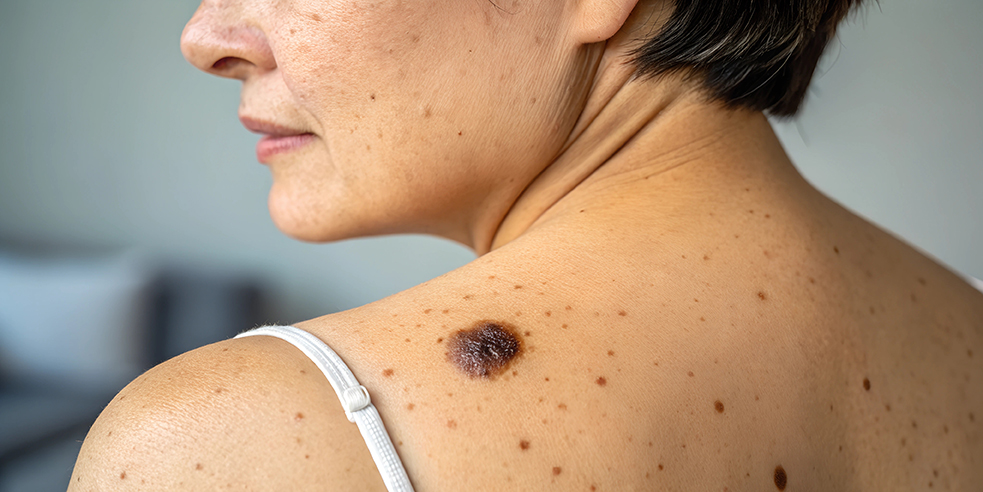- Chris Comans
- 1 Comment
When it comes to skin cancer, early detection can truly save lives. Here in Western Australia, we’re lucky to enjoy a sun-soaked lifestyle such as beach trips, barbecues, and weekends outdoors. However, we also have one of the highest rates of skin cancer in the world. That’s why regular self-checks are a powerful habit that every Aussie should adopt, especially those of us living under the harsh WA sun.
At Skin ChX, we’re passionate about raising awareness and empowering people to take control of their skin health. While professional skin cancer screening by a qualified practitioner is essential, doing your own regular self-checks at home can help you spot any changes early.
Here’s how to do it.
Why Self-Checking Matters
Australia’s UV index is among the highest globally. In WA, it often hits extreme levels, even on cloudy days. This means our risk of skin cancer, including melanoma, basal cell carcinoma, and squamous cell carcinoma, is significantly higher than in most other parts of the world.
The good news is that most skin cancers can be successfully treated when found early. That’s where a simple monthly self-check can make a huge difference.
What You’re Looking For
When you check your skin, you’re keeping an eye out for any new spots, changes to existing moles or freckles, or anything that looks unusual. Not all skin cancers look the same, so you don’t need to diagnose anything. You just need to notice when something has changed.
Use the ABCDE method as a helpful guide:
- A – Asymmetry: One half doesn’t match the other.
- B – Border: Edges that are irregular, ragged, or blurred.
- C – Colour: Uneven colours, including black, brown, red, white, or blue.
- D – Diameter: Larger than 6mm (about the size of a pencil eraser).
- E – Evolving: Any change in shape, size, colour, elevation, or behaviour (itching, bleeding, crusting).
But don’t stop there. Also look for:
- A new spot that looks different from your other freckles or moles
- A sore that doesn’t heal
- A red or scaly patch that doesn’t go away
- A small lump that’s firm or shiny
How to Do a Self-Check
You don’t need any fancy equipment. Just good lighting, a full-length mirror, a hand mirror, and a bit of patience.
Step-by-step guide:
- Face and Scalp: Start at your face, especially around the nose, lips, ears, and neck. Use a hand mirror to check behind your ears and scalp. You may need someone to help or use a hairdryer to part your hair.
- Upper Body: Check your chest, shoulders, arms, and underarms. Don’t forget your palms and under your fingernails.
- Torso: Examine your stomach, sides, and back. Use a mirror to see your upper and lower back.
- Lower Body: Look at your legs, the tops and soles of your feet, between your toes, and under your toenails. Yes, skin cancer can show up there too.
- Private Areas: Skin cancer can also develop in areas not exposed to the sun. Be thorough.
Tip: Take photos of your moles and spots with your phone so you can track any changes over time. You can even use a skin check app or journal to keep notes.
When to Book a Professional Screening
Even if you don’t spot anything unusual, it’s a great idea to schedule regular skin checks with a trained skin cancer screening practitioner. At Skin ChX, we specialise in full-body skin cancer screening and mole mapping, using advanced imaging to track even the smallest changes.
We recommend a full skin check at least once a year. More frequent checks are advised if you have lots of moles, a personal or family history of skin cancer, or if you spend a lot of time outdoors such as WA tradies and beachgoers.
Why Choose Skin ChX?
Based in Western Australia, Skin ChX is committed to accessible, professional, and non-invasive skin screening. We believe in prevention, awareness, and education because the more you know, the better chance you have at catching anything early.
Our practitioners are trained specifically in skin cancer detection. We take the time to explain our findings, provide full-body imaging, and give you peace of mind. No referral is needed.
Final Thoughts
Living in Western Australia means sunshine, lifestyle, and outdoor adventures. But it also means we need to be extra vigilant when it comes to our skin.
Make self-checks part of your routine, like brushing your teeth or applying sunscreen. Book your professional screening at Skin ChX to stay one step ahead.
Because your skin deserves the same care you give the rest of your health.
Ready to book your screening with Skin ChX?
Visit https://skinchx.com.au/ to schedule a skin cancer check with Christine Comans, our experienced dermatoscopist, today.

Back Skin Cancer: Early Detection via Dermoscopic Assessment